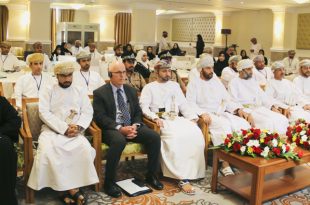The Oman Human Rights Commission in cooperation and coordination with the National Commission to Combat Human Trafficking organized a seminar on combating human trafficking (concept and practice). Experts and specialists in combating human trafficking from the United States Embassy in Muscat, the National Commission to Combat Human Trafficking, and the Ministry of Social Development , the Public Prosecution, the Royal Oman Police, and the General Federation of Trade Unions of Sultanate participated at the seminar together with representatives of a number of government institutions, civil society institutions, and entities related to issues of combating human trafficking.
In his speech during the opening ceremony of the symposium, Honorable Sheikh Abdullah bin Shuwain Al Hosni, Chairman of the Oman Human Rights Commission, said that the Sultanate has strived since the beginning of the blessed Renaissance era, led by His Majesty Sultan Qaboos bin Saeed to ensure enactment of laws, legislations and regulations that protect Human rights.
The basic Statute of the state comes on top of those legislations that guarantee justice and equality for all groups of society. Its articles ensured security and protection for the citizen and the resident against any violations affecting their dignity and legitimate rights.
n confirmation of the Sultanate’s concern for human rights, the Royal Decree No. (126/2008) issuing the Anti-Human Trafficking Law came to confirm the Sultanate’s interest in achieving these goals. To this end, the Sultanate issued several laws and legislations, and implemented the necessary mechanisms to reduce this crime and address its various causes
Honorable Sheikh the Chairman of the Commission also made clear that combating the crime of human trafficking is a joint responsibility by several internal and external parties. In this context, the Sultanate has sought during the past years to coordinate with the competent international bodies and organizations to set controls and procedures that limit this phenomenon. It also sought to develop rehabilitation programs for victims to help them integrate into society. It also conducted awareness campaigns, and prepared studies and research related to this aspect.
The opening ceremony also included an opening speech on human trafficking presented by the American expert Donald Buchner of the National Commission for Combatting Human Trafficking, in which he spoke about the desired goals of holding this symposium. He highlighted the existing coordination with international bodies and organizations concerned with combating human trafficking, and preparing studies and research related to this aspect. He also touched on the efforts to reduce this crime and eliminate its causes.
The first day of the symposium covered several themes. While covering the first theme, Nasser bin Abdullah Al-Riyami, Assistant Prosecutor spoke about the concept of human traffickers, and the protocol to prevent, suppress and punish human trafficking, especially women and children. He explained several hypothetical cases studies after which he touched on the definition of trafficking in human beings. He noted that the person who commits the crime of human trafficking is every person who intentionally, for the purpose of exploitation, uses, transmits, harbores, or receives a person through coercion, threat, or resourcefulness, by exploiting the position, or influence, or by exploiting a state of vulnerability or using an authority on that person, or by any other unlawful means, whether direct or indirect, or using or transmitting a minor, harboring or receiving him even if the means stipulated in the previous clause are not used.
He also clarified that the victim’s consent is not recognized in a number of cases, including if the victim was a minor, or if the victim was in a circumstantial or personal situation that cannot be counted upon with his consent or the freedom to choose.
In the second theme of the symposium, Marwa bint Hassan Al Balushi from the Ministry of Social Development talked about Dar Al Wifaq and its role in serving victims of human trafficking. She highlighted the powers of the Family Protection Department in setting up family protection plans, enhancing the necessary efforts and mechanisms, and contributing to laying the foundations that ensure the provision of stability and cohesion for families.
She also talked about the mechanism of receiving reports about abused cases, studying them, developing the necessary treatment plans, preparing the statistical database and family protection indicators, and contributing to societal awareness of the harms of abuse and violence and encouraging families to report.
Marwa Al Balushi highlighted the mechanism of arriving and receiving cases of human trafficking in Al-Wefaq House. She touched upon the services provided to victims of human trafficking represented in social protection through a set of interrelated and targeted mechanisms and activities that focus on liberating victims from psychological and social pressures as a result of being victims of crime. She also talked about ways to protect them from various risks through programs and plans that enable victims to overcome shocks through rehabilitation and reintegration programs by trained social and psychological specialists, and by providing legal protection through a set of legal measures. These measures include protecting victims, enhancing psychological integrity of the victims, providing victims with the opportunity to get assistance, health care. She also touched on the medical, psychological educational, social and training programs that are provided to the victims to meet their needs.
In the third theme of the symposium, Kabir Barwani of the United States Embassy in Muscat spoke about the report of the US State Department on human trafficking issues, and the mechanism used in its preparation. The symposium witnessed a remarkable interaction from the participants, and numerous interventions by specialists in human trafficking issues.





